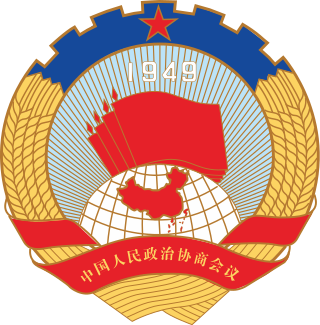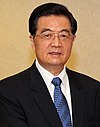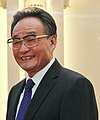
The State Council of the People's Republic of China, also known as the Central People's Government, is the chief administrative authority and the national cabinet of China. It is constitutionally the highest administrative organ of the country and the executive organ of the National People's Congress, the highest organ of state power. It is composed of the premier, vice premiers, state councilors, ministers of ministries, directors of committees, the auditor general, and the secretary-general.

Wen Jiabao is a Chinese retired politician who served as the premier of China from 2003 to 2013. In his capacity as head of government, Wen was regarded as the leading figure behind China's economic policy. From 2002 to 2012, he held membership in the Politburo Standing Committee of the Chinese Communist Party, the country's de facto top power organ, where he was ranked third out of nine members and after general secretary Hu Jintao and Wu Bangguo, chairman of the Standing Committee of the National People's Congress.

The Chinese People's Political Consultative Conference (CPPCC) is a political advisory body in the People's Republic of China and a central part of the Chinese Communist Party (CCP)'s united front system. Its members advise and put proposals for political and social issues to government bodies. However, the CPPCC is a body without real legislative power. While consultation does take place, it is supervised and directed by the CCP.

Li Keqiang was a Chinese economist and politician who served as the premier of China from 2013 to 2023. He was also the second-ranked member of the Politburo Standing Committee of the Chinese Communist Party (CCP) from 2012 to 2022. Li was a major part of the "fifth generation of Chinese leadership" along with Xi Jinping, the CCP general secretary.
The 5th Session of the 10th National People's Congress held its annual meeting from March 5 to March 15, 2007 at the Great Hall of the People in Beijing, China, in conjunction with the 2007 CPPCC. Many items were listed on the agenda for the two-week-long session of the National People's Congress. 2,937 delegates from every province and municipality attended, along with representatives from the People's Liberation Army. Among the delegations were those from the Special Administrative Regions of Hong Kong and Macau and a delegation representing Taiwan. Details on the election of these delegations can be found on the main article on the National People's Congress. The 2007 Session was chaired by Standing Committee Chairman Wu Bangguo, with the annual Government Report delivered by Premier Wen Jiabao. The 2007 Session also set the precedent of allowing foreign journalists to approach and interview any NPC members without restriction. All proposals and resolutions from the session for the first time were fully translated into English. The 2007 NPC formally approved the Property Law of the People's Republic of China which had been under discussion for the last several years. Shanghai party chief Chen Liangyu has been suspended and therefore did not participate in the NPC. However, Vice-Premier Huang Ju, who had been widely speculated in the Hong Kong media and Western sources to have fallen into political disgrace, though reported in the Chinese press as having been in bad health, made an appearance at the opening ceremonies on March 5. Huang genuinely appeared ill.
The 1st Session of the 11th National People's Congress held its annual meeting from March 5 to March 18, 2008 in the Great Hall of the People in Beijing, China, in conjunction with the 2008 CPPCC.
The 2nd Session of the 11th National People's Congress was the annual meeting of the highest legislative body of the People's Republic of China, which was held in March 2009 at the Great Hall of the People in Beijing. The event began on March 5 and lasted until March 13. The Congress was followed closely because of the possible impact any policy changes would have on the Chinese and world economy. Major issues discussed at the Congress include the 2007–2008 financial crisis, economy of China, curbing unemployment, and social welfare.
The 3rd Session of the 11th National People's Congress held its annual meeting in March 2010 at the Great Hall of the People in Beijing, China. The event opened on March 5, 2010 and concluded on March 14, 2010.

The 2010 China drought and dust storms were a series of severe droughts during the spring of 2010 that affected Yunnan, Guizhou, Guangxi, Sichuan, Shanxi, Henan, Shaanxi, Chongqing, Hebei and Gansu in the People's Republic of China as well as parts of Southeast Asia including Vietnam and Thailand, and dust storms in March and April that affected much of East Asia. The drought has been referred to as the worst in a century in southwestern China.
The 5th Session of the 11th National People's Congress held its annual meeting in March 2012 at the Great Hall of the People in Beijing, China. The event opened on 5 March and concluded on 14 March. Premier Wen Jiabao delivered his work report as Premier.
The 2012 SCO summit was the 12th annual summit of the Shanghai Cooperation Organisation.

The National People's Congress (NPC) is the highest organ of state power of the People's Republic of China. The NPC is the only branch of government in China, and per the principle of unified power, all state organs from the State Council to the Supreme People's Court (SPC) are subservient to it. With 2,977 members in 2023, it is the largest legislative body in the world. The NPC is elected for a term of five years. It holds annual sessions every spring, usually lasting from 10 to 14 days, in the Great Hall of the People on the west side of Tiananmen Square in Beijing.

Qin Gang is a Chinese former diplomat and politician who served as the 12th Minister of Foreign Affairs of China from December 2022 to July 2023 and as State Councillor of China from March to October 2023.

The Li Keqiang Government was the Central People's Government of China from 15 March 2013, when Premier Li Keqiang took office, until March 2023. It succeeded the Wen Jiabao government. Premier Li was ranked only second to Party general secretary Xi Jinping among 7 members of the 18th and 19th Politburo Standing Committee, top decision-making body of the Chinese Communist Party (CCP).

The 13th National People's Congress (NPC) was elected from October 2017 to February 2018 and was in session in the five-year period from 2018 to 2023. It held five sessions in this period, occurring around early March every year until before 2023, when the 14th National People's Congress first convened.
The 2019 National People's Congress, or the Second Session of the 13th National People's Congress, was held in March 2019 at the Great Hall of the People in Beijing, China. The session opened on 8 March and concluded on 20 March. Major state positions were elected in this session.

The three-child policy, whereby a couple can have three children, is a family planning policy in the People's Republic of China. The policy was announced on 31 May 2021 at a meeting of the Politburo of the Chinese Communist Party (CCP), chaired by CCP General Secretary Xi Jinping, on population aging.

The National Memorial Day for the Victims of the Nanjing Massacre is a national memorial day observed in China on 13 December annually in honor of the Chinese victims of the Second Sino-Japanese War. The observance draws attention to Japanese war crimes during this period. It was established in 2014 by the Standing Committee of the 12th National People's Congress.
The 2023 National People's Congress, officially the First Session of the 14th National People's Congress, was held in March 2023 at the Great Hall of the People in Beijing, China. The session opened on 5 March and concluded on 13 March. Major state positions of China were elected in this session.
The 2024 National People's Congress (NPC) was the Second Plenary Session of the 14th National People's Congress of the People's Republic of China (PRC). It was held from 5 March to 11 March 2024, concurrently with the Chinese People's Political Consultative Conference (CPPCC) as part of the annual Two Sessions. The NPC was held at the Great Hall of the People in Beijing.












